General
Centre of Excellence in Sickle Cell Anemia Launched as Mak Hosts AAP Meeting
Published
1 year agoon
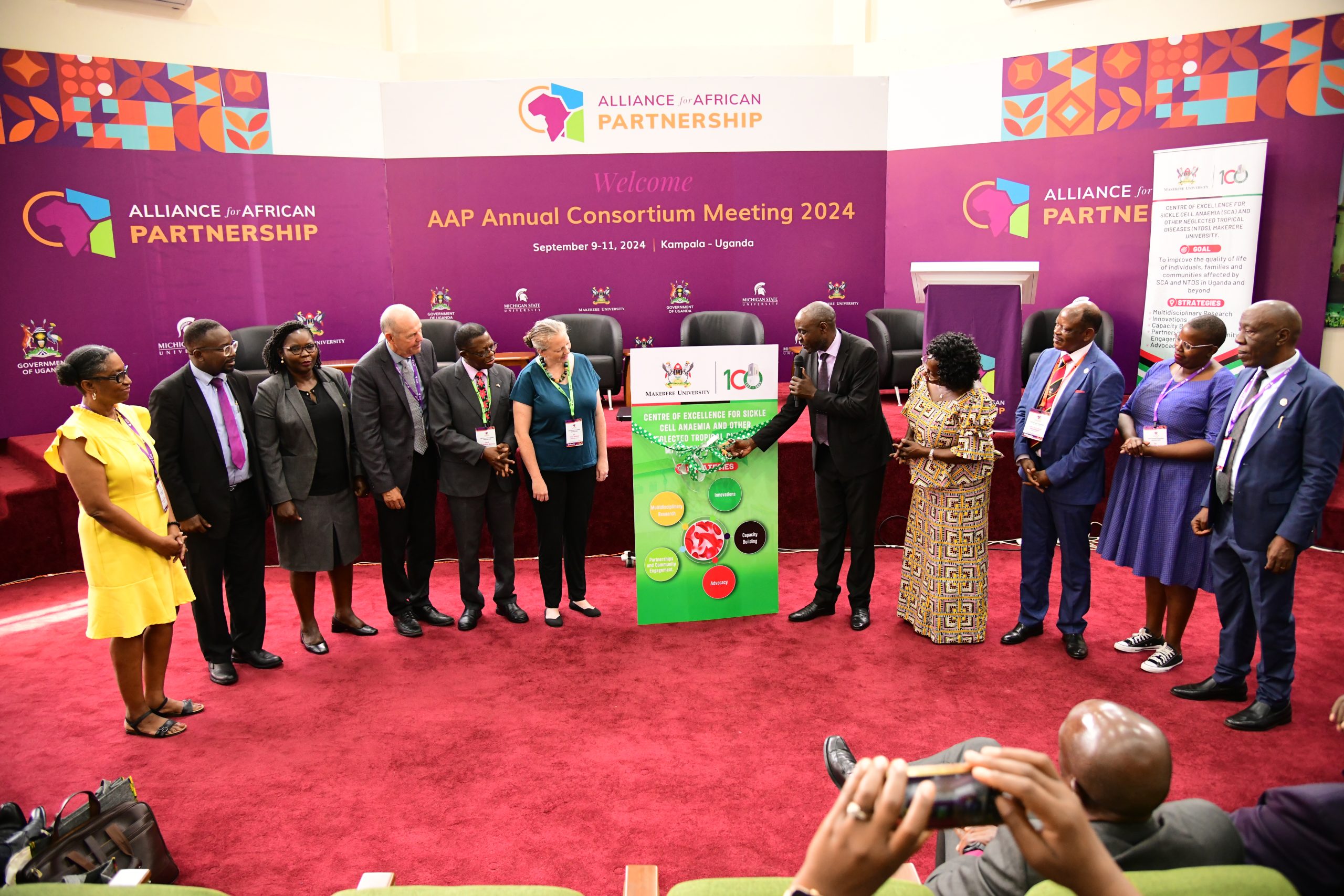
The State Minister for Higher Education Hon. Dr. J.C. Muyingo represented by the Commissioner in Charge of Admissions and Student Affairs Mr. Muzamil Mukwatampola on 9th September 2024 officially launched the Centre of Excellence for Sickle Cell Anemia and Other Neglected Tropical Diseases at the Alliance for African Partnership (AAP) of Michigan State University (MSU) Annual Consortium Meeting. Hosted by Makerere University in the School of Public Health Conference Hall, the three-day event that concluded on 11th September 2024 included an Annual Business Meeting, and a networking event hosted by the US Embassy and the US Ambassador to Uganda, H.E. William W. Popp.
The Annual gathering also included a Meeting with Members of Top Management, a tour of the Mak Innovation Hub, an AAP Advisory Board Meeting, a Public Dialogue on pioneering change and transforming institutions, a Student Recruitment Event by MSU, and a Forum on how African and global funders have worked across sectors for impactful programming.
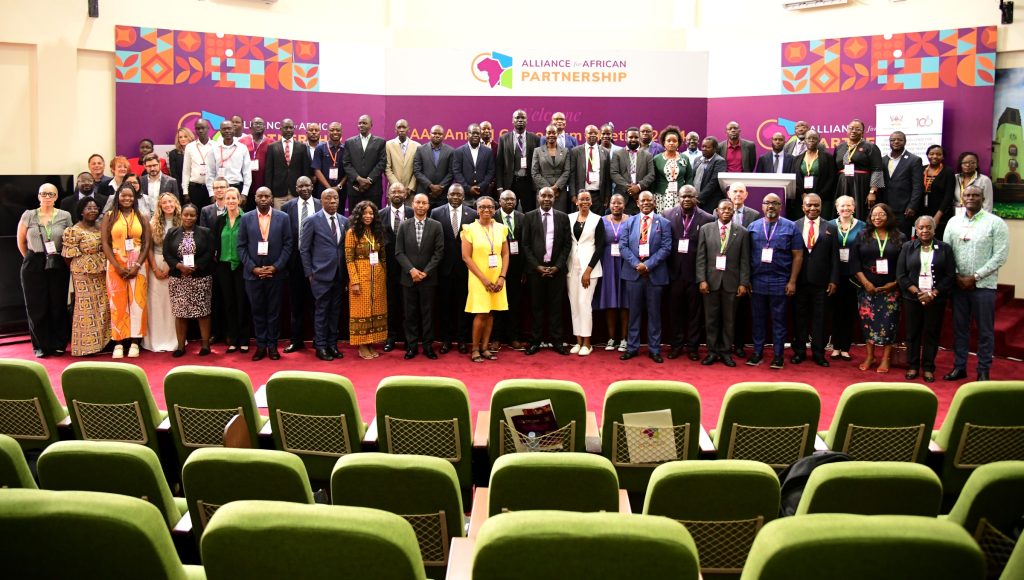
Opening Ceremony
Addressing participants at the opening event on 9th September, the Vice Chancellor, Prof. Barnabas Nawangwe acknowledged that it was a privilege for Makerere to host the Annual Consortium Meeting as it presents a lot of opportunities for AAP members to deliberate on innovations that can contribute to the betterment of humanity. Narrating a firsthand account of the loss of loved ones to Sickle Cell Disease, he added that Makerere can work together with consortia such as AAP to alleviate Africa’s health challenges.
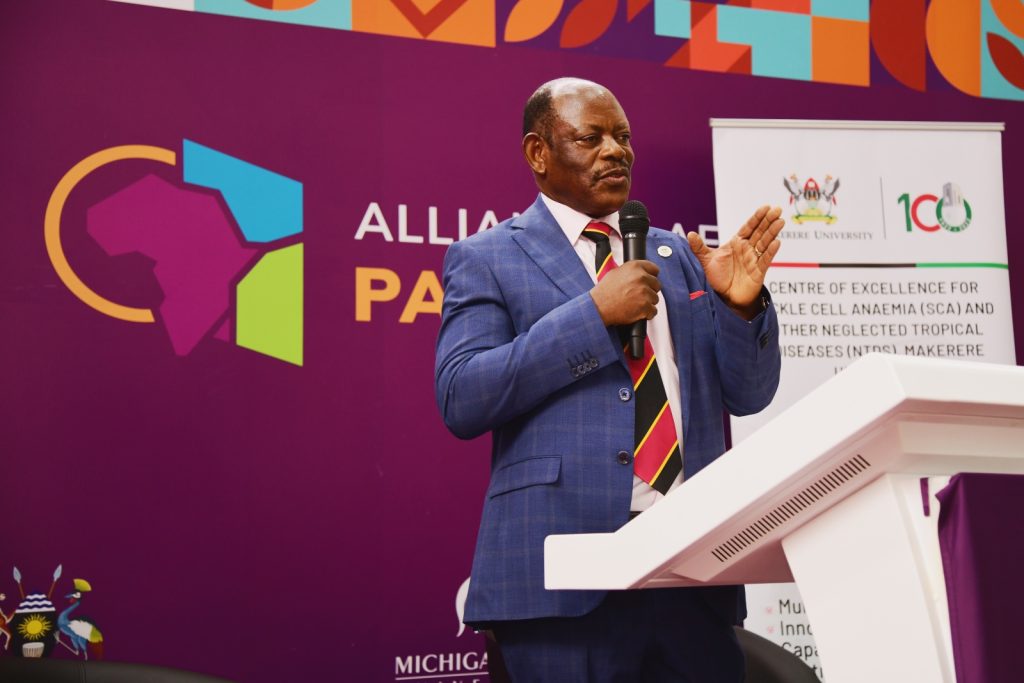
Prof. Nawangwe also current Chair of the AAP Advisory Board therefore expressed happiness that the funds used to start the Centre of Excellence for Sickle Cell Anemia and Other Neglected Tropical Diseases were received from Government of Uganda through the Makerere University Research and Innovation Fund (Mak-RIF). He invited all AAP Members to utilize Centre’s resources to conduct research on Sickle Cell Anemia and NTDs. The Centre is headed by Prof. Sarah Kiguli, a Professor of Paediatrics and Child Health at the College of Health Sciences (CHS).
Delivering the opening remarks, Prof. Steven Hanson the MSU Vice Provost and Dean for International Studies and Programs thanked Makerere University for the demonstrable leadership in tackling challenges such as Sickle Cell Anemia and Neglected Tropical Diseases.
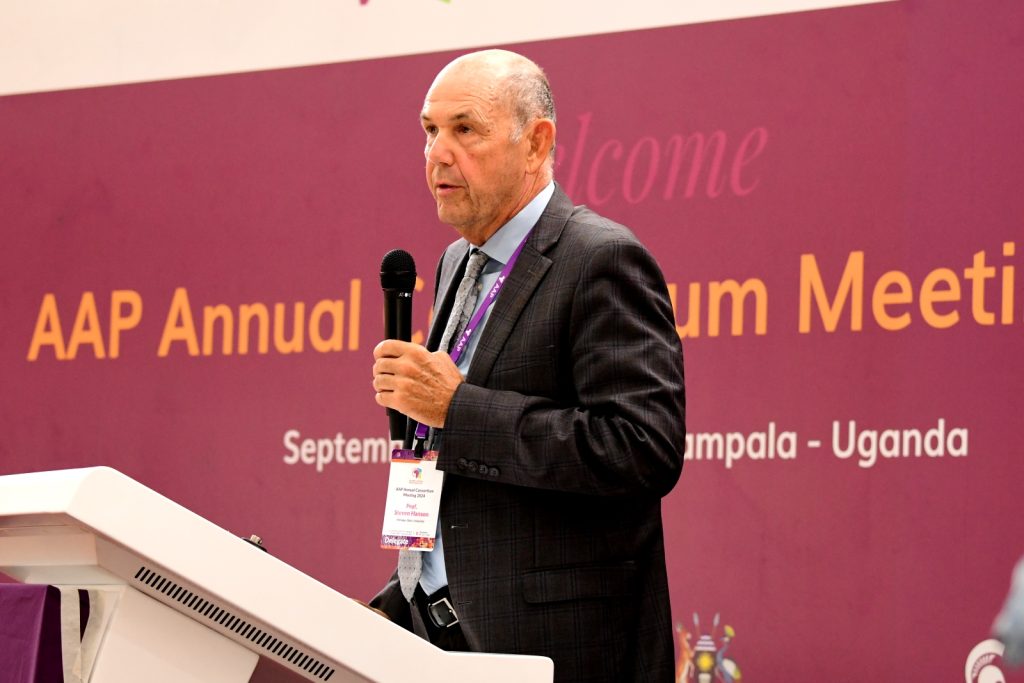
“When an institution like invests its resources, creates infrastructure and prioritises addressing big problems like these by creating a Centre for Excellence, we have an obligation to not just learn from them but to work together alongside them because we know that in a global society, challenges faced by one community affect us all, and solutions built together help us all” he added.
Adding his voice to the congratulatory messages, Mr. Mukwatampola on behalf of Dr. J.C. Muyingo noted that the Centre of Excellence will serve as a beacon of hope for not only treating Sickle Cell Anemia and Neglected Tropical Diseases but also fostering research and collaboration that plays a pivotal role in bridging the gap between new findings and treatment.
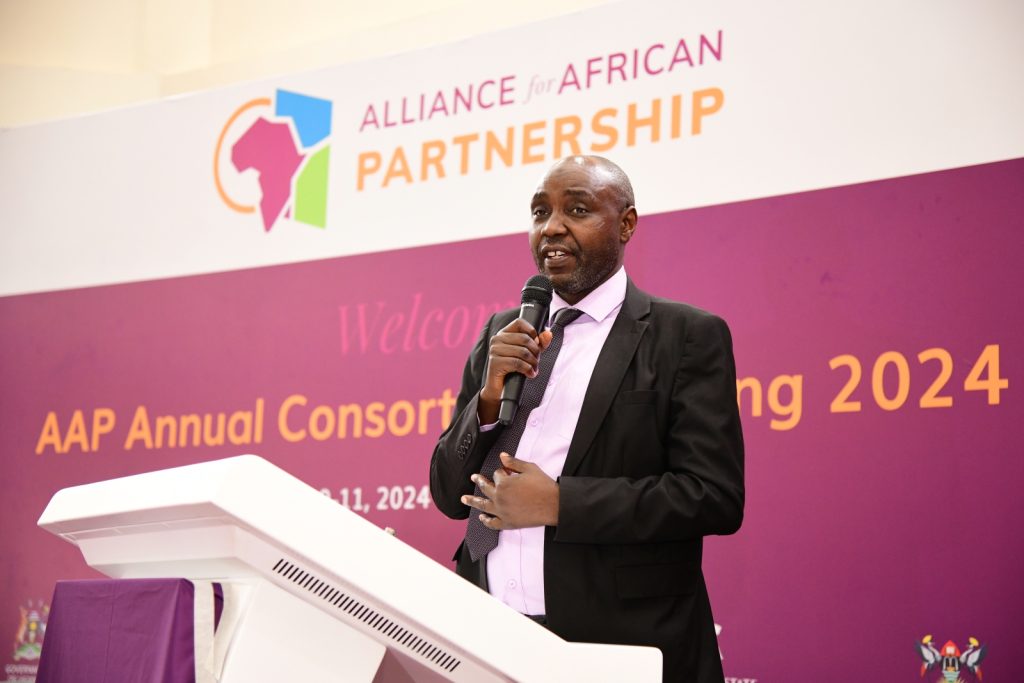
“This launch therefore underscores the NRM Government’s commitment to strengthening healthcare systems and prioritizing diseases that have long been neglected” added the State Minister’s remarks.
The opening ceremony also played witness to the announcement of Prof. David Meya an Infectious Disease physician at the College of Health Sciences (CHS) as the Oliver Reginald Tambo Africa Research Chair Initiative (ORTARChI) for Infectious Diseases recipient. The announcement was made by Dr. Dorothy Ngila, Director of Strategic Partnerships at the National Research Foundation of South Africa (NRF).
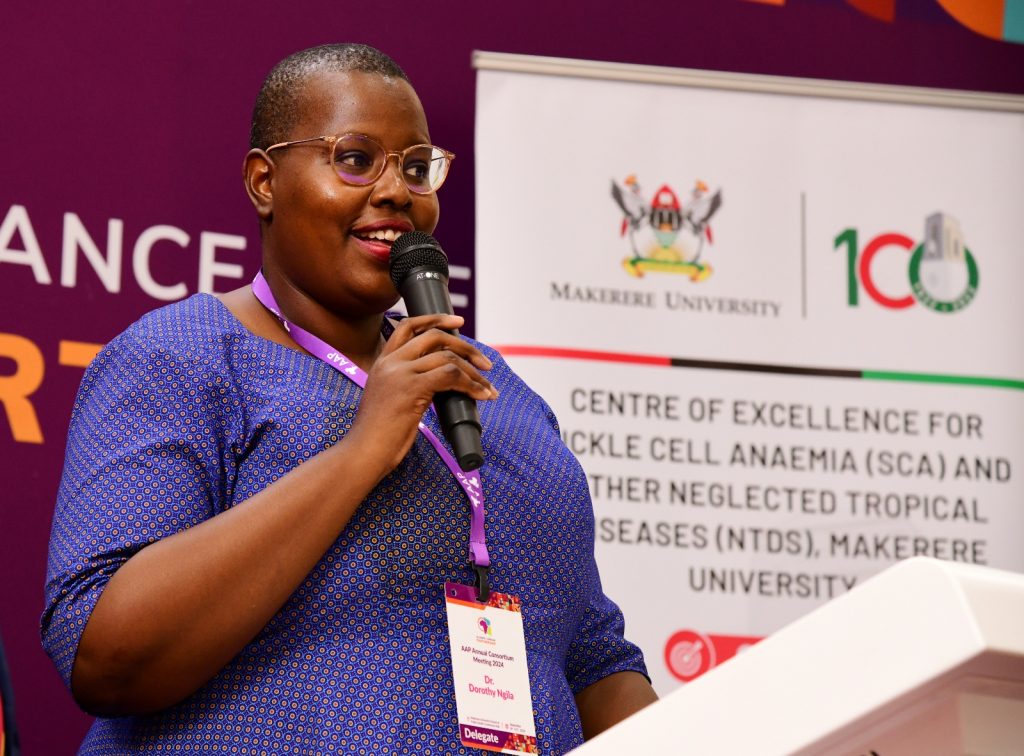
“The panel found the University (Makerere)’s involvement in AAP, RUFORUM, ARUA, AAUN, WUN, and many other university networks really excellent and on the basis of this was satisfied that the Chair would be in good hands to support the developmental trajectory of not only Uganda but also East Africa and the rest of the continent” remarked Dr. Ngila, also Vice Chair of the AAP Advisory Board.
AAP Dialogue in line with the AU Year of Education (2024)
The Vice Chancellor opened the Dialogue held 10th September 2024 on a philosophical note, by quoting Presidents Mandela and Nyerere.
“Education is the most powerful weapon which you can use to change the world.”
PRESIDENT NELSON MANDELA
“We must run while they walk”.
MWALIMU JULIUS KAMBARAGE NYERERE
Taking note of the World Bank recommendation that Africa must produce as many as 100,000 PhDs over the next ten years so as to move the continent out of poverty, Prof. Nawangwe stated that “Education is extremely important and it is important for us to understand what kind of education will transform our continent.”
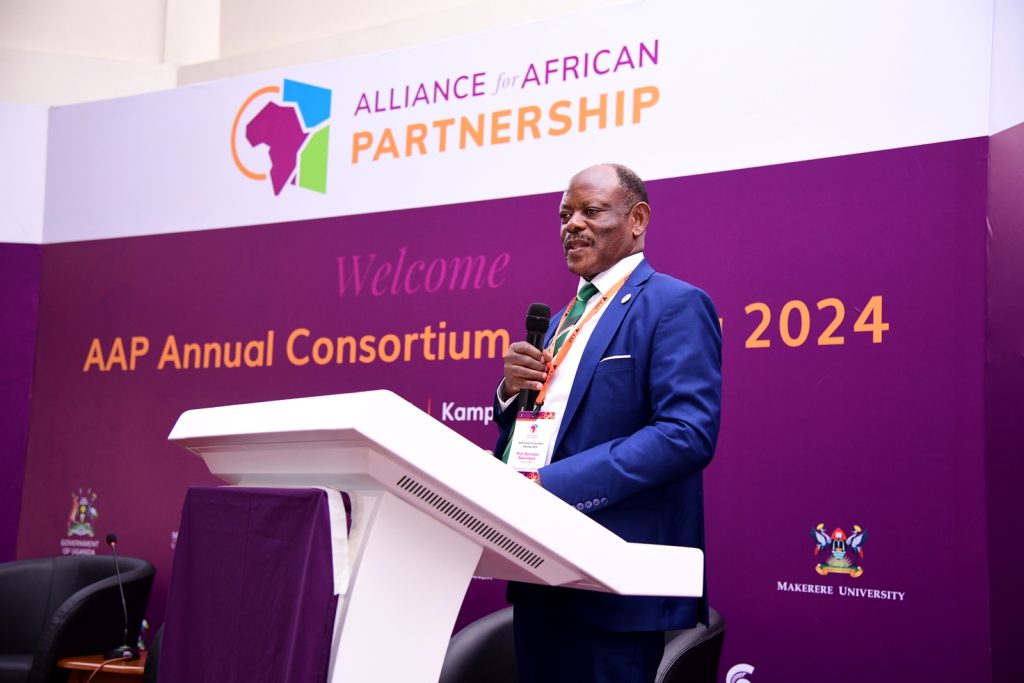
However, and on the question of quantity versus quality and relevance, he further explained that for the African case, “any education is important and relevant.” This he amplified by stating that how the recipient of that education uses it to transform themselves and society is what renders it relevant.
Delivering the keynote address, Dr. Thangavel Palanivel, UNDP Uganda Senior Economic Advisor applauded Makerere’s role as a lighthouse among African Universities by pioneering change and transforming institutions through not only educating future leaders but also contributing to research, innovations as well as shaping policy and strategy. He added that Makerere and other Universities have the dual role of responding to emerging needs, challenges and opportunities as well as developing the knowledge and skills of youth to match the changing labour market.
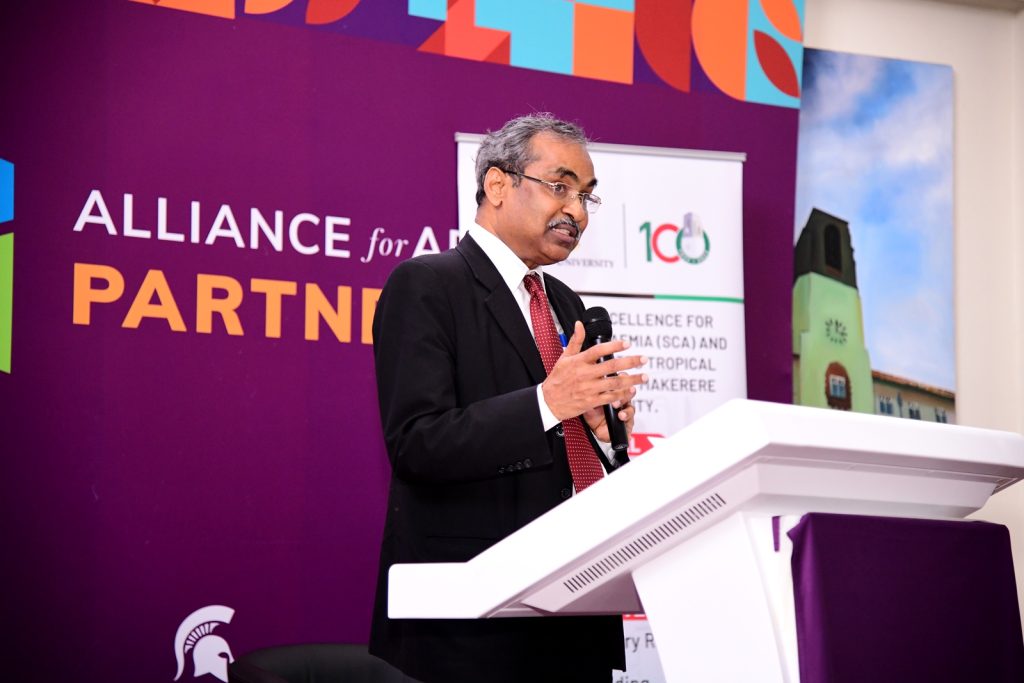
He went on to outline what UNDP sees as potential areas of change as; Digital Transformation and Artificial Intelligence, Innovation in Curricula to address mismatches in the labour market, Interdisciplinary undertakings, Enhanced Research and Innovation, Community Engagement as well as Leadership and Governance that embraces flexibility.
Dr. Palanivel outlined UNDP’s commitment to continue providing unlimited technical support to institutions as well as supporting initiatives such as Innovation Hubs at Makerere and Kabale University, and supporting the Policy Lab at Makerere University to foster implementation of the Parish Development Model (PDM).
Panelists have their say
The discussion that followed the keynote had as panelists; Prof. Brendan Cantwell – Erickson Distinguished Chair in Higher Education at MSU, Dr. Elizabeth Nansubuga – Higher Education Resource Services-East Africa (HERS-EA) Associate, Dr. Patrick Okori – Executive Secretary, Regional Universities Forum for Capacity Building in Agriculture (RUFORUM) and Prof. Richard Tabulawa – Deputy Vice Chancellor – Teaching and Learning, University of Botswana. The session moderators were Prof. Ronald Bisaso, Deputy Principal, College of Education and External Studies (CEES) and Prof. Flavia Senkubuge, Acting Vice Principal of Student Affairs, University of Pretoria.
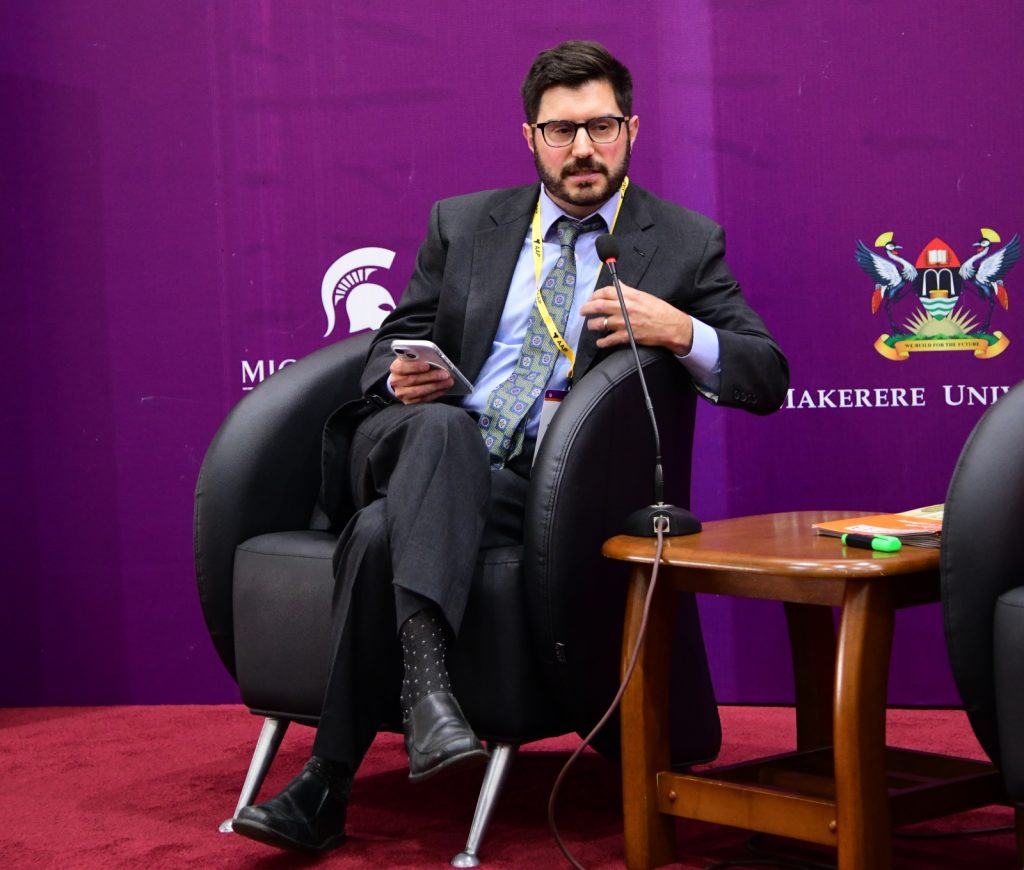
Prof. Cantwell noted that maintaining and increasing the quality and quantity of systems coupled with inclusivity would help the continent move towards the 100,000 PhDs in ten years target. Furthermore was the need to embrace the creativity and innovation that resides in people who know the needs of their communities so as to develop a new generation of scholars equipped to steer universities to navigate new challenges.
He equally stated the need for quasi-independence by universities so that they are not directly controlled by the state, so as to be able to professionalise their workforce and enhance their salaries competitively. Prof. Cantwell further urged universities to be loosely coupled and environmentally open, to embrace networks and communication especially in the form of South-South partnerships and concluded calling on the State, Private Sector, NGOs, CSOs and Multinationals to fund the research and resource intensiveness of universities.
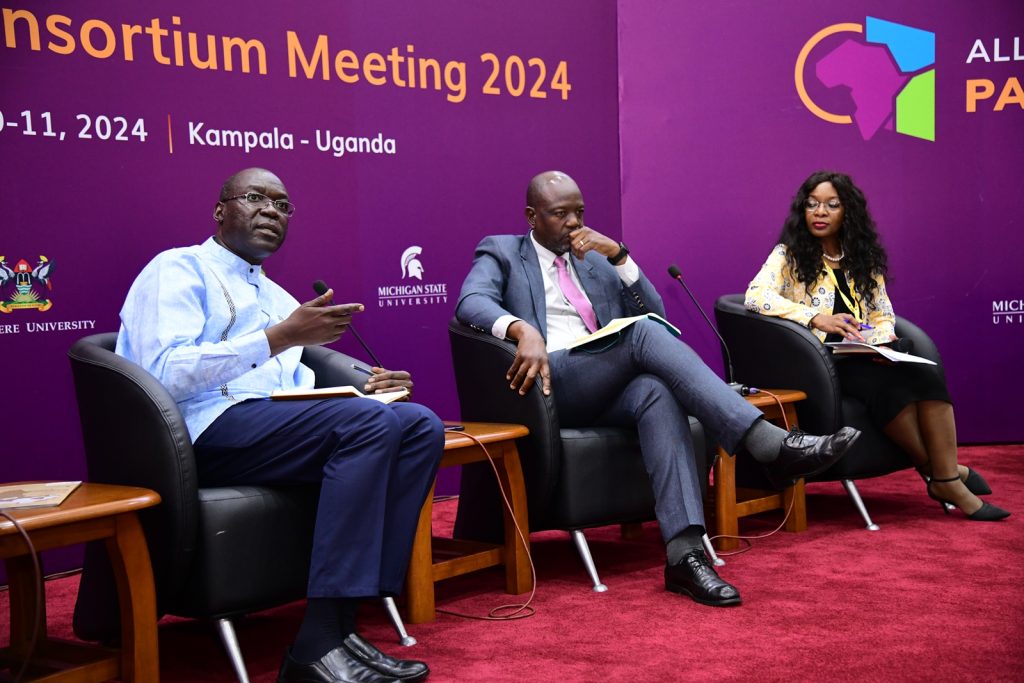
Prof. Okori on his part observed that whereas universities account for 40% of Full-Time Equivalent (FTE) scientists, they spend most of their time teaching and less of it innovating. He therefore called for the need for universities to focus on training transformative leaders across staff and communities as well as produce science solutions that are relevant to societal needs and scalable so as to attract funding.
On the need for innovative curricula, he shared that RUFORUM embraced coursework-based PhD which have increased the number of candidates trained and strengthened Agri-food systems resilience in Africa, with particular emphasis on crop improvement. Prof. Okori equally stressed the need for Universities to shift from project-based to programmatic-based models so as to attract long-term funding and partnerships.
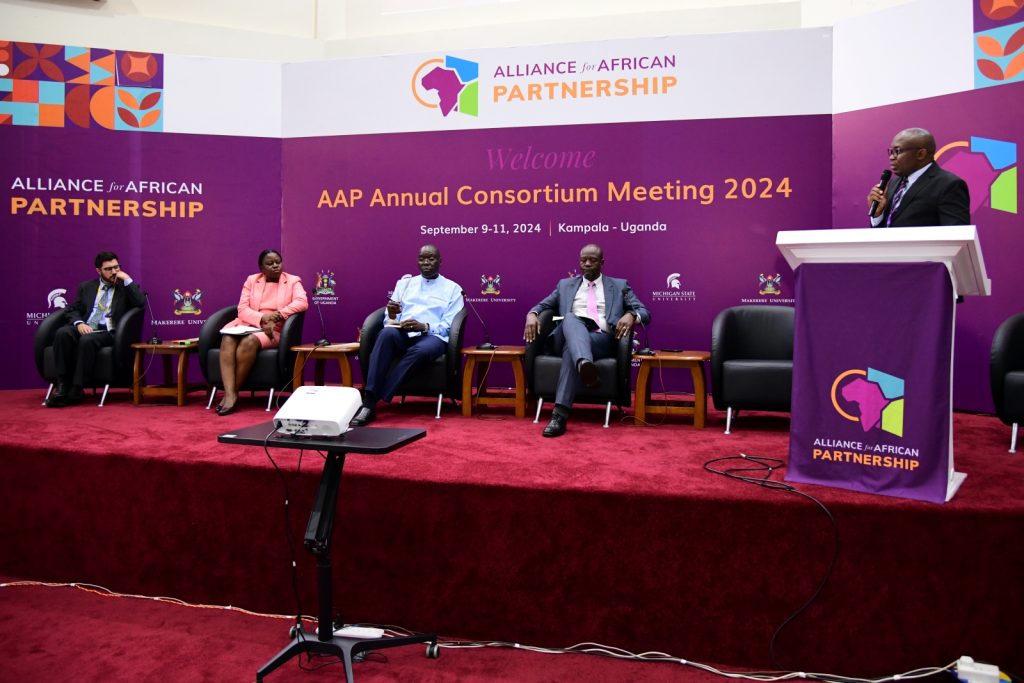
Prof. Tabulawa who shared the University of Botswana’s staff development strategy noted that the Government’s role in providing funds for staff to be trained abroad and hiring international expertise to fill local gaps was and remains fundamental. He equally shared sandwich programmes that enable staff to be trained while at work as a game changer.
He equally shared the University of Botswana’s Equity, Inclusion and Sustainability strategy that introduced an affirmative action policy that relaxed admission requirements for students with disabilities as well as those from marginalized communities as pivotal. To address the skills mismatch in the labour market, Prof. Tabulawa shared that despite its failure in other countries, the outcome-based approach to education allows for players from the industry to provide input into curricula, thereby increasing relevance of programmes taught.
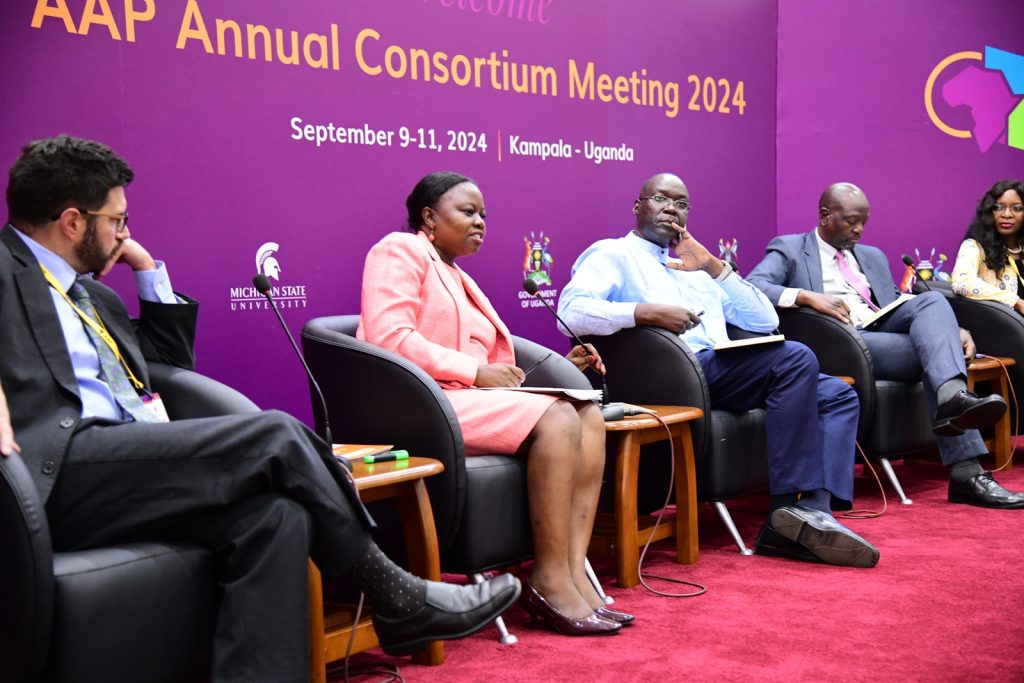
Tackling the gender perspective, Dr. Nansubuga shared that whereas Makerere has achieved gender parity at undergraduate level, the same is yet to be achieved at postgraduate level due to a number of barriers. These, she added, have been identified over time and embedded into HERS-EA innovative curriculum that aims to shape female leaders’ career and professional development aspirations.
As such, HERS-EA has carried out policy advocacy workshops with male allies and mentorship workshops that help women develop their PhD concepts and identify supervisors. Dr. Nansubuga added that HERS-EA enables female leaders to tap into global partnerships for grants and as a result of these empowerment initiatives, eight of the female graduates from the HERS-EA Academy have become Deans. She nevertheless highlighted the need to do more at a higher level, as majority of female leaders who attend the Academy have receive support from their Schools, Colleges, Administrative Units and the Vice Chancellor’s Office, which she applauded for the enormous support, including granting HERS-EA Office Space.
Concluding Remarks
The Dialogue was closed by Prof. Mwenda Ntarangwi, Vice Chancellor, USIU-Africa who urged participants to always distinguish between proactive and reactive responses opportunities, the former being preferable as it caters for the partners’ strategic objectives. Secondly, he urged institutions to have a stake in partnerships so as to work towards their survival. He equally called for examination of what institutions bring to the table that others can tap into, citing the launch of the Centre of Excellence for Sickle Cell Anemia and Other Neglected Tropical Diseases as a show of great commitment by the Government of Uganda.
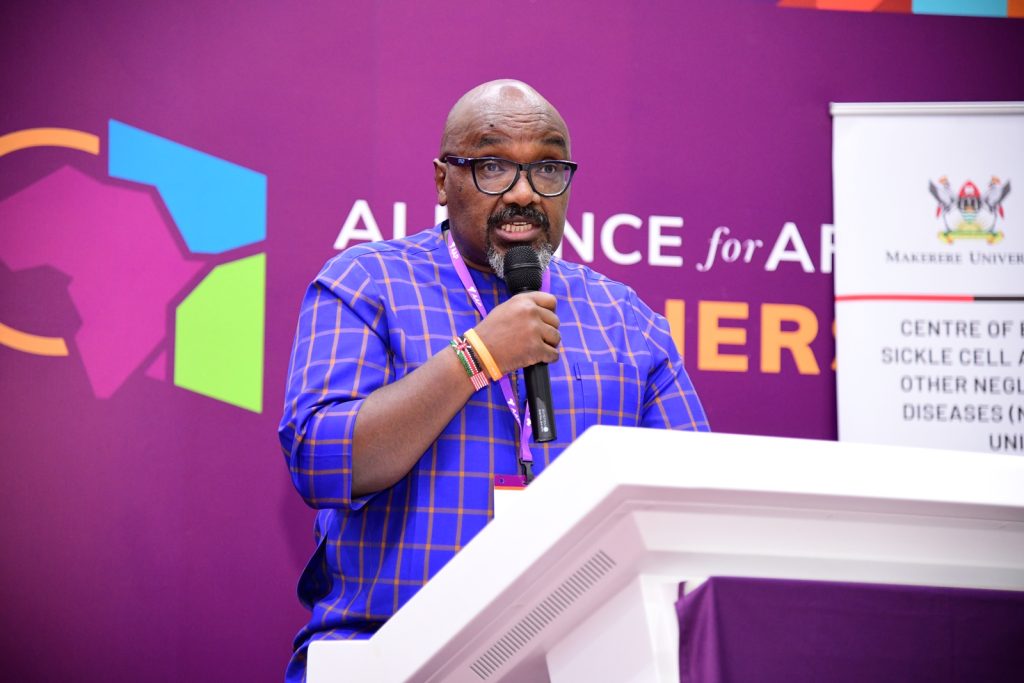
“What it means, and I hope this is true, is that the results of the research being done here will be applied to solving problems that the Government has identified as priority” added Prof. Ntarangwi.
He concluded by adding that AAP Members were gathered at Makerere, not because they didn’t have convention centres of their own but because it is important to work together. “Conflict, disease and climate change have demonstrated to us that there are no boundaries that can keep all these things out.”
You may like
-


Mak Selected to Host Alliance for African Partnership Africa Office
-


Meet Najjuka Whitney, The Girl Who Missed Law and Found Her Voice
-


Makerere University School of Public Health Graduates First Cohort of Cost-Effectiveness Analysis Short Course
-


Climate variability found to shape malaria trends in Yumbe District
-


Mak hosts First African Symposium on Natural Capital Accounting and Climate-Sensitive Macroeconomic Modelling
-


Uganda Martyrs Namugongo Students Turn Organic Waste into Soap in an Innovative School Project on Sustainable Waste Management
General
Mak Selected to Host Alliance for African Partnership Africa Office
Published
12 hours agoon
February 23, 2026
Makerere University has been selected to host the Africa Office of the Alliance for African Partnership (AAP). The significant milestone that underscores Makerere’s role in fostering research, innovation, and global collaborations across the continent was announced at a meeting of the University’s Central Management with an AAP delegation on 23rd February 2026.
Makerere’s selection was based on the University’s robust commitment, alignment with the AAP’s Strategic Plan, and proven ability to manage consortium activities. The AAP, which was initiated by Michigan State University (MSU) in collaboration with Ten African Universities and agricultural policy research networks in 2016, targets critical challenges in education, youth empowerment, health and nutrition, agri-food systems, science and technology, water, energy, environment, and culture and society.
Addressing the delegation consisting of AAP Co-Directors from MSU, Dr. Jose Jackson-Malete and Dr. Amy Jamison, accompanied by newly-appointed Director of the AAP Africa Office, Dr. Racheal Ddungu Mugabi and Ms. Clare Cheromoi, the Vice Chancellor, Prof. Barnabas Nawangwe who appreciated the choice of Makerere to host the Africa Office said:
“One of the greatest challenges facing African universities is PhD training, particularly supervisory capacity. Through partnerships such as the Alliance for African Partnership we can leverage international expertise to strengthen supervision—whether through training supervisors or through joint supervision arrangements.”
Prof. Nawangwe equally applauded joint initiatives such as the Grant Writing and Publication project, which gave rise to the establishment of a Writing Centre that he said can be used to build capacity in AAP member universities with Makerere as the hub. Officially launched on 21st March 2023, the project is living up to its expectation of becoming a springboard for strong postdoctoral collaborative research for both institutions and other US universities.
Dr. Titus Awokuse, Vice Provost and Dean for International Studies and Programs at Michigan State University (MSU) who attended virtually, reiterated that Makerere’s selection reflects its long-standing commitment to advancing African higher education, research excellence, and meaningful global collaboration.
Reflecting on the origins of the Alliance for African Partnerships (AAP), Dr. Awokuse explained that nearly a decade ago, MSU initiated a transformative conversation in Atlanta centered on the question: How should we partner differently? From this dialogue emerged AAP—an Africa-centered consortium that now brings together 12 institutions across Africa and the United States.

He emphasized that AAP is grounded in equity, mutual benefit, shared leadership, and deep respect for African priorities and expertise. Since its founding, MSU has served as convener and key supporter, working with member institutions to strengthen research collaboration, promote faculty and student engagement, and address shared development priorities.
Dr. Awokuse underscored that AAP’s success is the result of collective vision and commitment, not the efforts of a single institution. He paid tribute to Lilongwe University of Agriculture and Natural Resources for hosting the Africa Office in its early years and acknowledged the foundational leadership of the inaugural Africa Office Director.
He described the launch of the Africa Office at Makerere University as a significant milestone that reinforces Africa-led leadership, strengthens regional collaboration, and enhances responsiveness to emerging opportunities. MSU, he affirmed, remains fully committed to AAP and to working closely with Makerere and all consortium partners to expand collaborative research, nurture the next generation of scholars, and advance Africa-led solutions to global challenges.
The newly-appointed AAP Africa Office Director, Dr. Racheal Ddungu Mugabi is a member of faculty in the Department of Development Studies, Institute of Gender and Development Studies. Her work on intersectional inequalities in Uganda and other Global South regions uniquely positions her to drive collaborative research and partnerships at the Africa Office.
Initially founded by ten African Universities and MSU, AAP now comprises eleven African members including; the African Network of Agricultural Policy Institutes (ANAPRI)-Zambia, Egerton University-Kenya, Lilongwe University of Agriculture and Natural Resources (LUANAR)-Malawi, Makerere University-Uganda, United States International University-Africa-Kenya, Universite Cheikh Anta Diop-Senegal, Universite Yambo Ouologuem de Bamako-Mali, University of Botswana-Botswana, University of Dar es Salaam-Tanzania, University of Nigeria, Nsukka-Nigeria, and the latest, University of Pretoria-South Africa.
These Universites collaborate under Focal Points to advance policy-relevant research and sustainable development. Makerere University’s Focal Point is Prof. Robert Wamala, Director of Research, Innovations and Partnerships (DRIP).
Addressing the University Management, Dr. Jackson-Malete outlined the African Futures Research Leadership Program, which nurtures early career scholars through mentorship and skill-building as one of AAP’s flagship programs. She noted that the Program that prioritizes female participants or men committed to promoting women in higher education has for the first time during its fifth cohort admitted the first male, Dr. Alfadaniels Mabingo from the Department of Performing Arts and Film, Makerere University.
The AAP Africa Office at Makerere will coordinate activities, boost research collaboration, mobilize resources, and enhance global engagements for socio-economic transformation. This aligns with Makerere‘s broader goals of leveraging international expertise to build resilient institutions.
View more photos from the event: https://flic.kr/s/aHBqjCLjoA
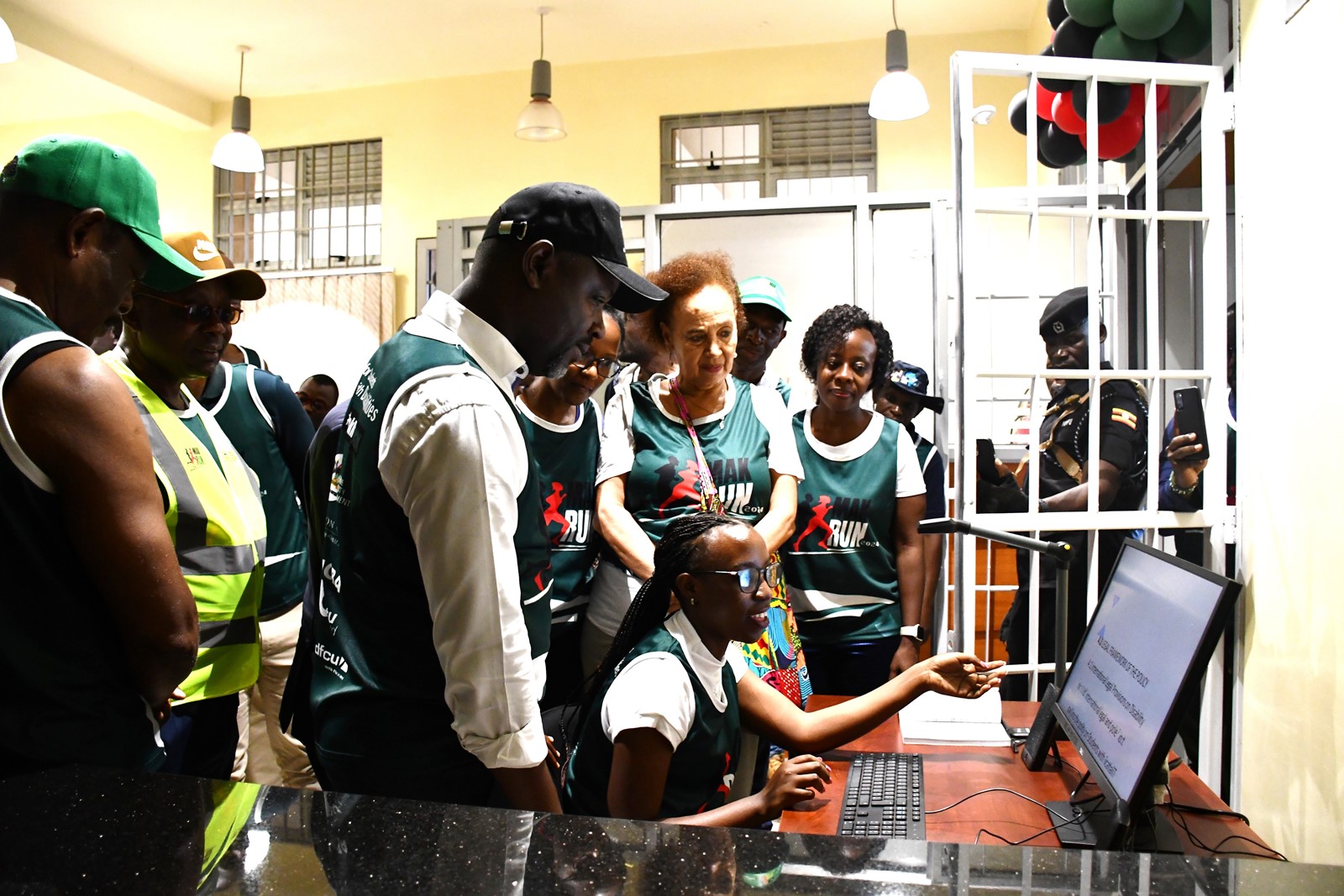
Students with disabilities at Makerere University have been requested to stop seeking for special attention and instead look for solutions and opportunities for personal growth.
This was during a mental wellness, inclusion and safeguarding session organized by the Dean of Students office and the Mastercard Foundation Scholars Program at Makerere University.
Addressing students on mental health and disability inclusion, Mr. Marvin Ggaliwango, a lecturer at the College of Computing and Information Sciences (CoCIS), noted that if the students stop complaining, they will become empowered to take charge of their own development, build resilience and engage confidently in both academic and social environments.
“Turn your lived experiences into tools for innovation. Stop complaining and start creating solutions for yourselves. You are the one living this life, and that gives you the authority to be an expert. When you develop a solution, it doesn’t just benefit you, it helps others too, by removing barriers,” Mr. Marvin Ggaliwango, said.
He encouraged students to see themselves not as victims of circumstance, but as active participants and co-creators of the inclusive environment they wish to experience.
“Learn how to communicate effectively and humbly. If you have a problem, express yourself clearly. Do not isolate yourself or feel resentful. You are not defined by disability, you may face disadvantages, but you still have ability,” he encouraged.
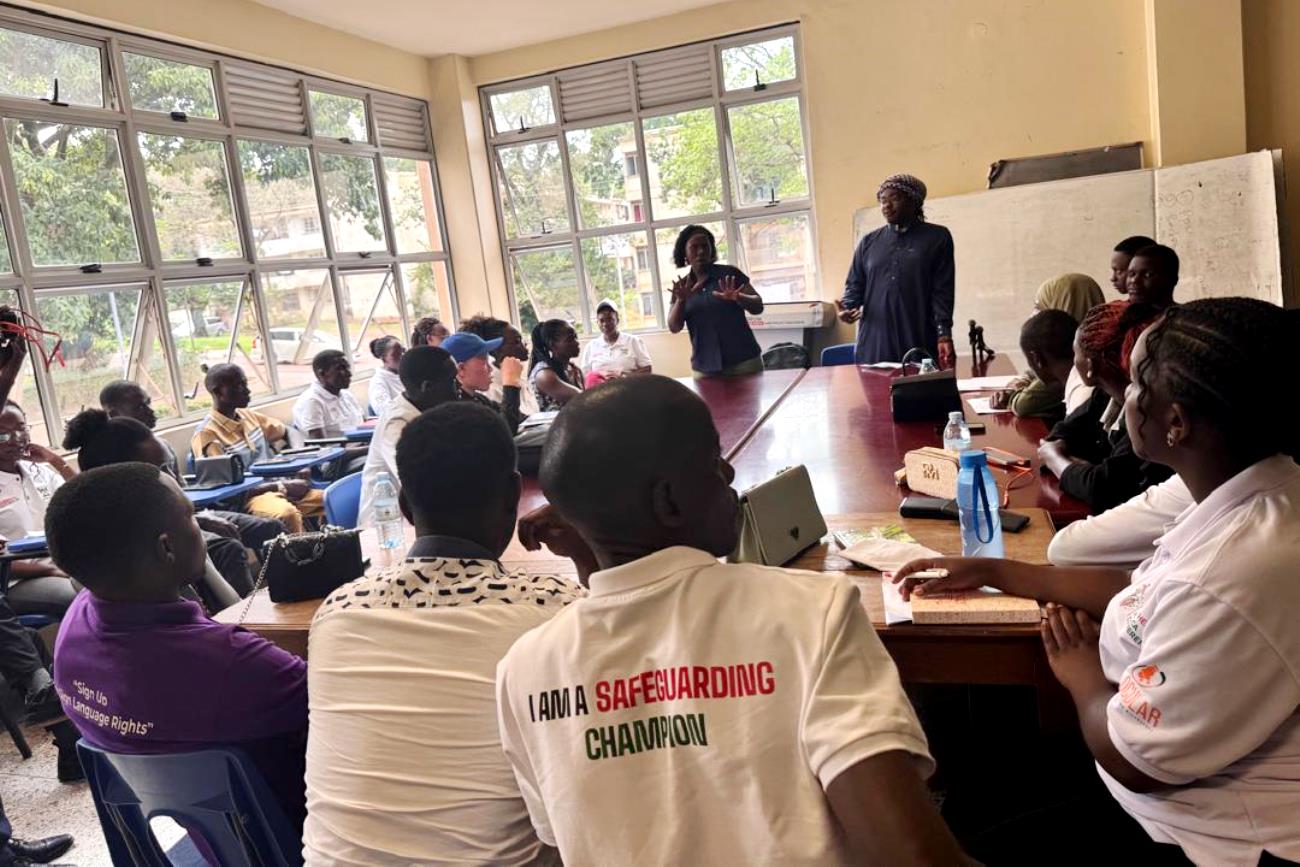
Throughout the session, students listened attentively as he emphasized the importance of self-awareness and personal responsibility, urging them to understand their strengths, acknowledge their limitations and take deliberate steps toward personal growth while contributing positively to the University community.
“We must enhance and ensure that our mental health is number one. Always choose yourself first. Choose what makes you happy and protect your peace. If you are at peace with yourself, your academics will improve. There is a strong link between mental wellness and academic success,” Mr. Ggaliwango, noted.
In his speech, Mr. Musa Mwambu, the Disability Inclusion Advisor at Light for the World Uganda, called upon the students with disabilities to enhance and ensure that their mental health is prioritized.
“As students living with disabilities, sometimes you over expect, because you have a disability you should be given, listened to and when people do not listen to you, you attribute it to your disability, get it from me, even those without disabilities are not listened too. Things are not happening to you because of your disability it is because of the world we live in. Everything that happens to you can happen to others,” Mr Mwambu, noted.
“Have fun with your life. Make yourself happy and be smart. Present yourself in public confidently wherever you go. The way you carry yourself can improve your mental health and how others perceive you,” Mr. Mwambu said.
He reminded the students that gaining admission to Makerere is itself a milestone.
“There are many people without disabilities who have never stepped at Makerere University. Find something that empowers you and hold on to it. You may have a physical impairment, but if you are brilliant in class, you can lead discussions and inspire others,” he added.

During the session, Dr. Rodney Rugyema, the Acting Principal Warden, welcomed the students back from the long holiday. He assured them that the University is committed to their safety and well-being while on campus.
Dr. Rugyema emphasized that the University has systems in place to protect students, both physically and psychologically and encouraged them to report any concerns promptly.
“When you are at the University, you are not on your own, we are always here for you. For us to engage you on mental wellness and inclusion, we want you to be in the right state of mind, whole and complete,” Dr Rugyema, said.
He added: “We are here to empower you and we are calling upon you not be a risk for yourself and always be able to detect risks that are likely to affect your mental health and works towards avoiding them and reporting them to ensure that the University manages them before they escalate into real harm whose impact is more serious than you can think,”
During the session, Ms. Diane Nabikolo Osiru highlighted the University’s broader commitment to safeguarding.
Safeguarding at Makerere University refers to measures put in place to promote safety and wellness of all students, staffs and other stakeholders.
“At Makerere University, safety is not a luxury for few. but it is a right for every student. As the semesters begins, we are urging you to learn how to identify signs of harm or abuses and report them to the appropriate safeguarding contact points,” Ms Nabikolo, said.
For support in case of any harm or abuse, International and Refugee Students, can access support through the Advancement and International Office, while Students with Disabilities, can utilize the Disability Support Center. Those with personal and emotional challenges, can visit the Counselling and Guidance Centre.
In his speech, Dr Joab Agaba, a Lecturer in the College of Computing and Information Sciences, guided students how to report risks and incidences to the MakSafeSpace, the e-reporting platform complimenting the other University traditional reporting channels.
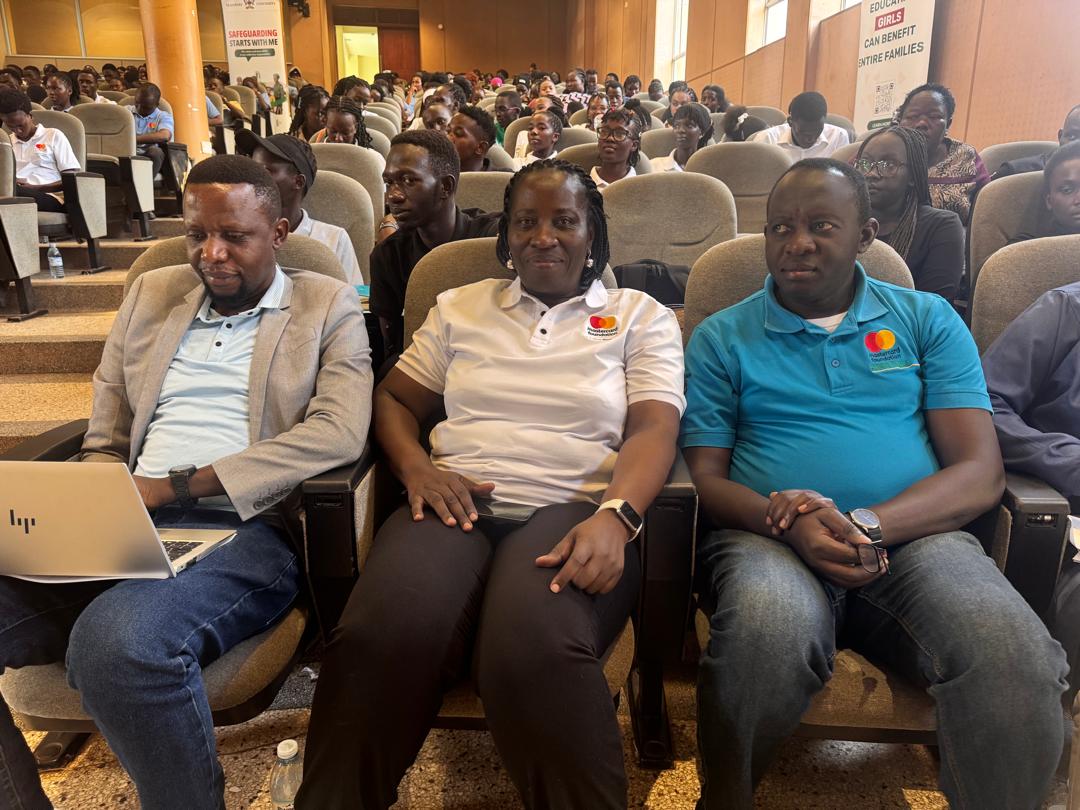
Mr. Henry Nsubuga, the Manager of the Counselling and Guidance Center, shared practical strategies for coping with stress effectively including time management, setting realistic goals, seeking support from peers or counsellors.
Students speak out
Shanitah Nahamya, 2nd year student of the Bachelor of Adult and Community Education
“I have learned how to respectfully and appropriately engage with students with disabilities. In the past, I often felt pity when I encountered them, but now I understand that what they need is not pity, it is respect, support, and equal opportunity.”
Guo Dorothy Geri, 1st year student of the Bachelor of Commerce
“I have learnt how to use inclusive language. Before offering help to a student with a disability, I will first ask them, because not all the time do they need our help. You might think someone wants to be helped to cross the road, yet they are waiting for someone.”
Valentines Doris Aduka, 1st Year student of the Bachelor of Biomedical Science
“I have been calling students with disabilities special names, thinking it was kind. But I have learned that they do not want to be treated differently or labeled in a special way. What they value most is being treated like everyone else, with respect, dignity, and fairness.”
General
Strengthening Global Partnerships to Advance Research, Innovation, and Graduate Training: Makerere University Hosts Delegation from the University of Warwick
Published
5 days agoon
February 19, 2026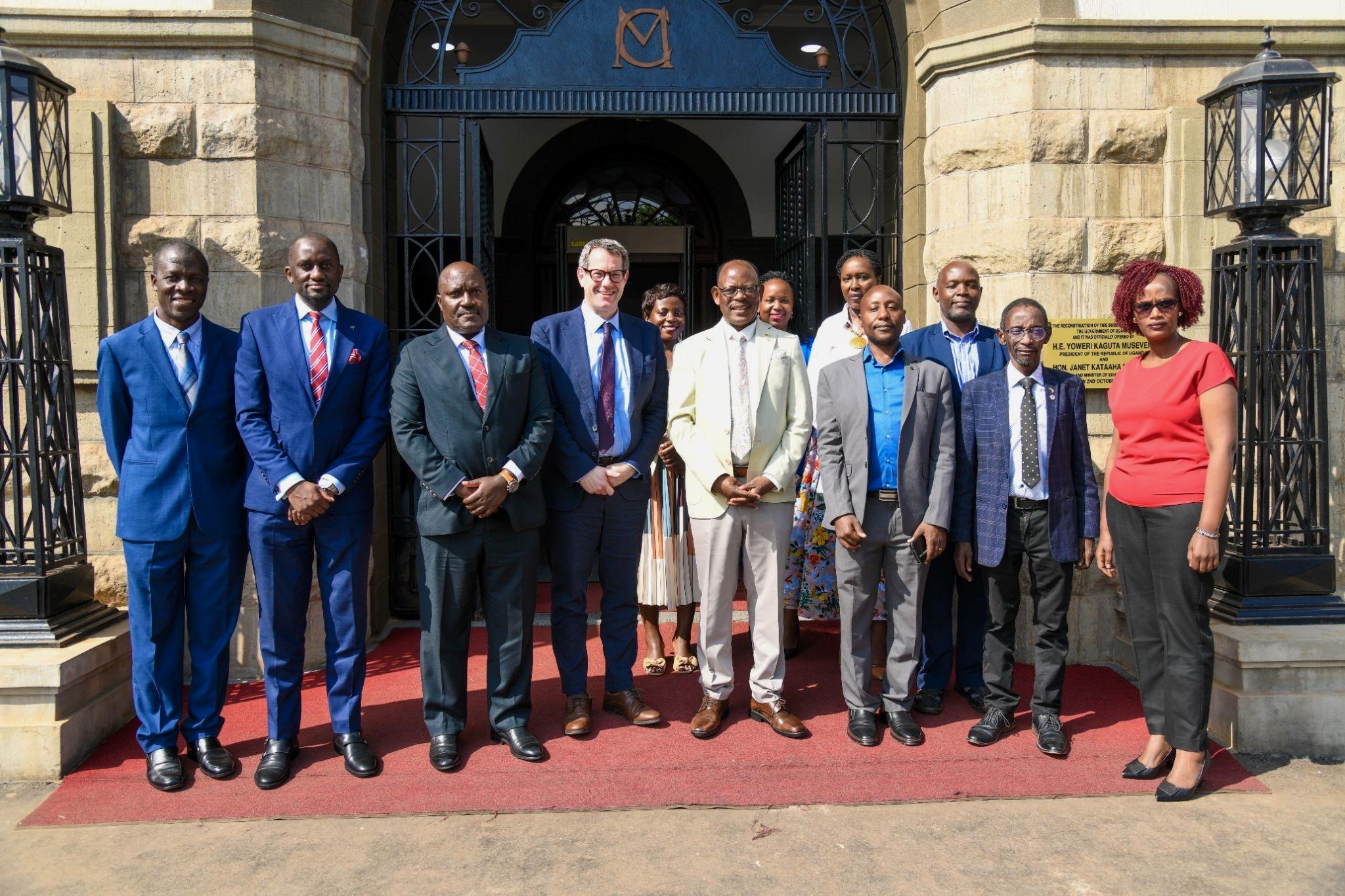
Makerere University continues to deepen its global engagement agenda through strategic partnerships that enhance research, innovation, and graduate training. On Friday, 13th February, 2025, during a recent engagement with a delegation from the University of Warwick (UK), university leaders, researchers, and administrators explored potential collaborations to address pressing development challenges and strengthen institutional capacity.
Expanding Collaboration in Research and Innovation
Welcoming the delegation, Prof. Fred Masagazi-Masaazi, Chairperson of the Makerere University Research and Innovations Fund (Mak-RIF) Grants Management Committee, emphasized the growing dialogue between Makerere University and the University of Warwick. He noted that ongoing discussions are focused on resource mobilization to support research and innovation, as well as building sustainable academic exchanges for both staff and students.
Dr. Roy Mayega, Mak-RIF Coordinator, together with Mrs. Phoebe Lutaaya Kamya, Deputy Coordinator, and members of the Mak-RIF team, highlighted the Fund’s role in catalyzing collaborative research and strengthening partnerships that translate research into societal impact.
Mr. Simon Kizito, Deputy University Secretary, outlined key areas identified for collaboration, including joint research and innovation initiatives, benchmarking visits across disciplines such as law, science, and ICT, and student exchanges designed to strengthen applied research skills. He also pointed to opportunities for training Makerere staff in specialized areas such as tropical diseases and innovation ecosystems, drawing lessons from Warwick’s strong linkages with industry partners located within its campus.
Makerere’s Strategic Priorities and Global Role
In his remarks, the Vice Chancellor underscored the longstanding relationship between Makerere University and the University of Warwick, dating back to the early 1980s, initially through staff training and more recently through collaborative research.
He highlighted Makerere’s historic contribution to leadership development across Africa and beyond, and the University’s continued growth following faculty rebuilding efforts in the 1980s, which have strengthened its research capacity. Today, Makerere has over 1,300 academic staff, more than 1,000 of whom hold PhDs, positioning the institution to play a leading role in knowledge production.
The Vice Chancellor also outlined major thematic areas where partnerships are critical:
- Climate change and food security: Researchers at the College of Agricultural and Environmental Sciences (CAES) are developing drought-resistant and high-yield seed varieties to address changing weather patterns and food insecurity.
- Public health and infectious diseases: Uganda faces frequent outbreaks of diseases such as Ebola and Marburg, and Makerere has built strong capacity in outbreak response and tropical medicine. The University’s medical school and the Infectious Diseases Institute (IDI) continue to play a pivotal role in research and treatment.
- Peace and conflict studies: Through initiatives such as the Rotary Peace Centre, Makerere contributes to training global leaders in conflict resolution.
- Climate-sensitive macroeconomic modelling: Makerere recently hosted a conference in collaboration with the Ministry of Finance, Planning and Economic Development to advocate for climate-responsive macroeconomic modelling and to plan for the establishment of a Centre of Excellence in this field.
- Innovation and technology: The University’s innovation ecosystem has produced notable outputs, including Africa’s first electric vehicle and ongoing work to expand incubation facilities to enable students to graduate with viable enterprises.
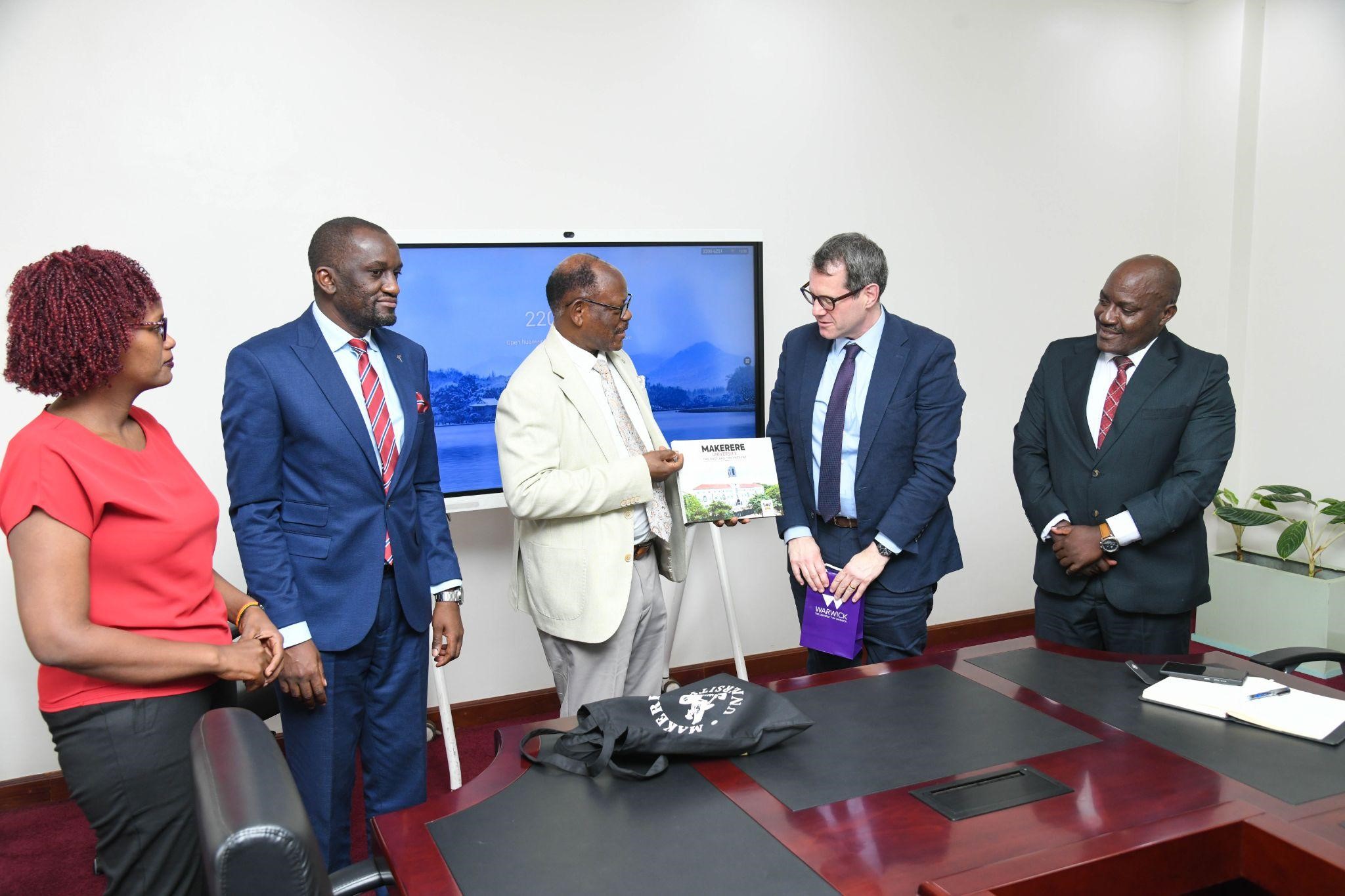
The Vice Chancellor emphasized that addressing youth unemployment remains a central priority, noting that innovation, entrepreneurship, and graduate training are essential to building stable societies.
He further stressed the importance of expanding graduate education. Africa currently produces a small proportion of global research output, and increasing PhD and Master’s training supported by international partnerships remains critical to accelerating knowledge production and development outcomes.
Internationalization and Shared Learning
Speaking on behalf of the University of Warwick, Professor Daniel Branch, Deputy Vice Chancellor, reflected on Warwick’s own institutional journey, noting that its growth has been driven by a strong focus on internationalization, innovation, and research. He expressed Warwick’s commitment to building productive partnerships with African universities, including Makerere, to advance joint research, training, and innovation.
Professor Branch also highlighted the importance of university-industry linkages, citing examples such as collaborations with major manufacturing firms that provide practical training opportunities and inform curriculum development.
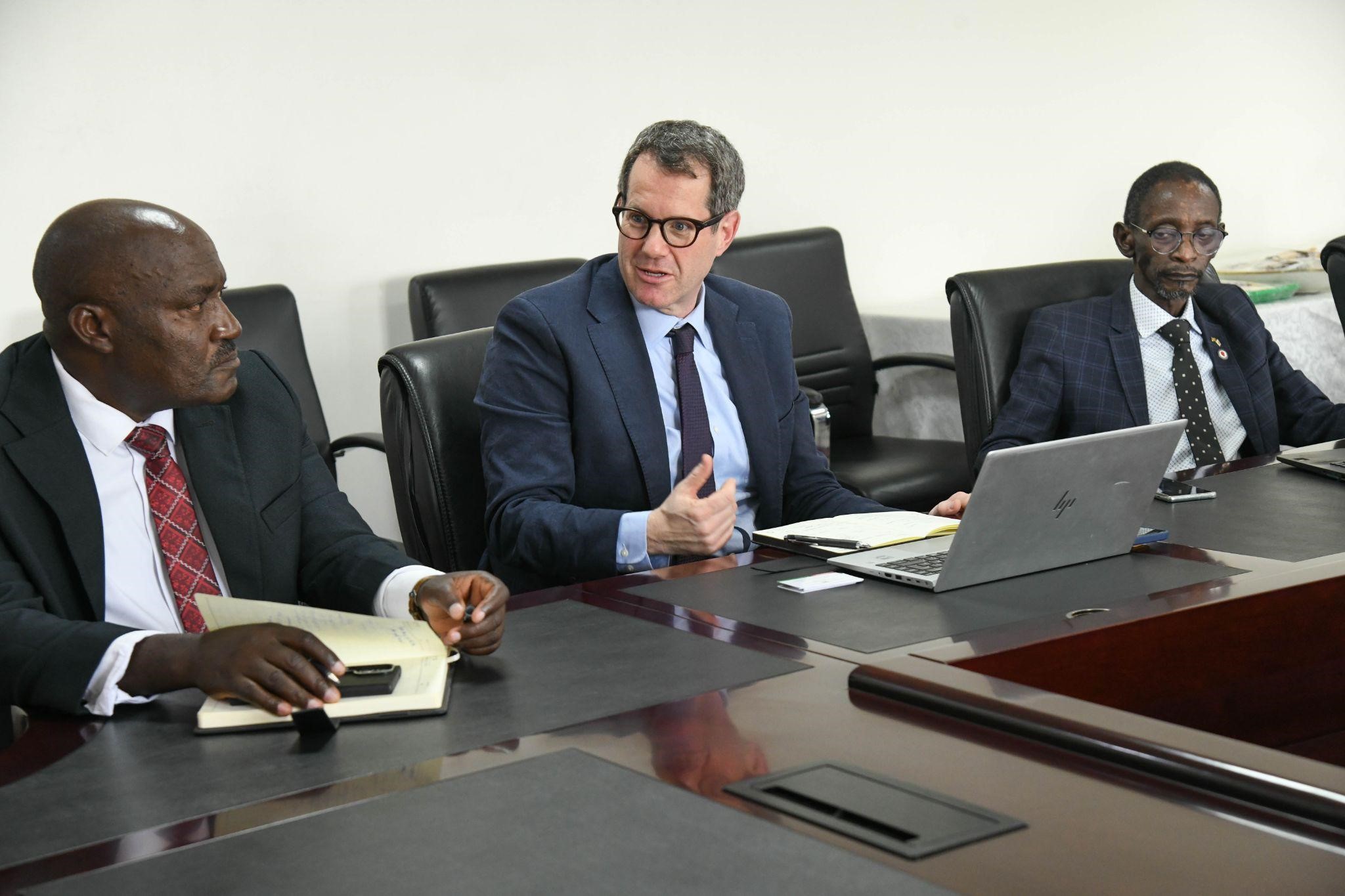
Showcasing Research and Innovation at CEDAT
A second session of the engagement was held at the College of Engineering, Design, Art and Technology (CEDAT), where academic leaders and researchers presented ongoing work across multiple disciplines.
Presentations included:
- Development of a solar water pump through reverse engineering (Dr. Edmund Tumusiime)
- Crane Cloud, a locally developed cloud-computing platform (team from the College of Computing and Information Sciences)
- Profiling gaseous emissions associated with burnt bricks (Dr. Nathan)
- Integration of centralized grid and decentralized renewable off-grid systems: a techno-economic analysis (Dr. Abubaker Waswa)
- Innovation and digitalization pathways for affordable housing in Sub-Saharan Africa (Prof. Stephen Mukiibi)
The session was attended by CEDAT leadership, including the Principal, Prof. Moses Musinguzi, as well as deans and heads of department from engineering, built environment, and industrial and fine arts. The day’s activities were concluded with a tour of Makerere University’s Innovation Hub.
The engagement reaffirmed Makerere University’s commitment to building strong, mutually beneficial partnerships that accelerate research, strengthen graduate training, and drive innovation. As global challenges such as climate change, public health threats, and youth unemployment intensify, collaboration among universities remains essential to developing scalable, evidence-based solutions.
Through partnerships such as the one Makerere University and the University of Warwick hope to activate through a Memorandum of Understanding in the near future, Makerere continues to position itself as a leading research-intensive university dedicated to transforming society through knowledge, innovation, and global cooperation.
Caroline Kainomugisha is the Communications Officer, Advancement Office, Makerere University.
Trending
-

 General2 weeks ago
General2 weeks agoAptitude Exam (Paper 1) Results for the Mature Age Entry Scheme 2026/2027
-

 Health5 days ago
Health5 days agoUganda has until 2030 to end Open Defecation as Ntaro’s PhD Examines Kabale’s Progress
-

 General6 days ago
General6 days agoMastercard Foundation Scholars embrace and honour their rich cultural diversity
-

 General2 weeks ago
General2 weeks agoFor Youth by Youth – Call for Second Cohort Applications
-

 Agriculture & Environment4 days ago
Agriculture & Environment4 days agoUganda Martyrs Namugongo Students Turn Organic Waste into Soap in an Innovative School Project on Sustainable Waste Management
